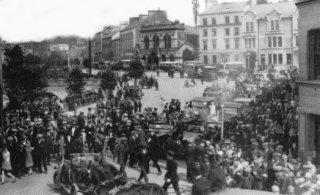We have written of the patriots mentioned in the Yeats poem, with the exception of Robert Emmet. Since it’s about ‘romantic
On September 8, 1803, Irish patriot Robert Emmet, age 25, wrote from his cell in Kilmainham jail,
Emmet, the son of a
Returning to
“…we war not against property — we are against no religious sect — we war no against past opinions or prejudice — we war against English dominion.”
How well he knew Sarah before this time is unclear. Sarah’s brother, Richard, knew Robert well from
“You could not see Miss Curran and not help liking her…her look was the mildest, and the softest, and the sweetest look you ever saw.”
Following another coup attention on July 23, 1803, Emmet again went into hiding. He sent Sarah a message asking her to elope with him to the
The earliest letters were simply copies of poems. But the love letters, partly in coded language, were full of information that could identify her as the writer. Later letters expressed her fear of angering her father, and the latest letter focused completely on her anxiety about Robert’s safety:
“I passed the house you are in twice this day, but did not see you. If I thought you were in safety, I would be comparatively happy, at least. I cannot help listening to every idle report…I cannot tell you how uneasy I shall be until I know that you have got this. Let me know immediately. I request you to burn it instantly…Goodbye my dear friend, but not forever.”
Emmet kept all her letters inside his coat. On August 30, at the questioning after his arrest, he was asked point blank, “By whom were these letters written that were found upon your person?” He succeeded in keeping Sarah’s name out of the proceedings, mentioning only “a delicate and virtuous female.” He then protested, “I would rather give up my own life than injure another person.”
Nine days later, Emmet wrote the letter extracted here, revealing her name, and on September 9 the Curran house was searched. With British soldiers downstairs, Sarah’s sister Amelia only just succeeded in burning Emmet’s letters. John Philpot Curran, furious that Sarah had threatened their lives and his career, ordered her out of the house. She took refuge with friends a few hundred miles away in
Robert Emmet’s speech from the dock is an inspiration to generations of Irish revolutionaries, and is still widely quoted today:
“…Let no man write my epitaph…Let my memory be left in oblivion and my tomb remain un inscribed until other times and other men can do justice to my character. When my country takes her place among the nations of the earth, then, and not till then, let my epitaph be written. I have done.”
He had not quite done. In a letter to Sarah’s brother Richard, he wrote:
“I have injured the happiness of a sister that you love…Oh Richard! I have no excuse to offer, but that I meant the reverse; I intended as much happiness for Sarah as the most ardent lover could have given her. I never did tell you how much I idolised her…”
After Emmet’s death, abandoned by her family and living with friends in
“She is far from the land where her young hero sleeps,
And lovers around her are sighing,
But coldly she turns from their gaze, and weeps,
For her heart in his grave is lying.”
